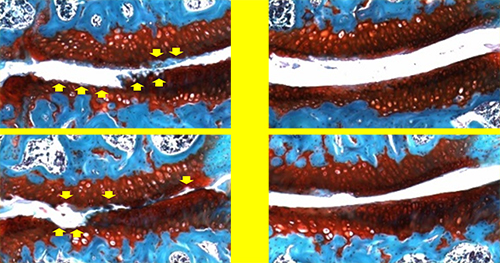Research Highlights
Vol.7, July 2016
mRNA-based gene therapy for osteoarthritis
Osteoarthritis (OA) is a chronic, painful and debilitating condition affecting elderly people across the globe. It is an age-related change but often accelerated by joint instability, inducing cartilage degradation. However, current therapies are limited to symptomatic medications to reduce inflammation and pain, and there are no disease-modifying therapy of OA.
Now, Keiji Itaka(Principal Research Scientist of Innovation Center of NanoMedicine) and co-workers at the University of Tokyo’s Graduate School of Medicine and the Graduate School of Engineering have developed a new gene therapy that could become the first disease-modifying osteoarthritic drug system for use in clinical practice.
The team wanted to deliver a cartilage-anabolic factor called RUNX1 directly into joints. RUNX1 is a transcriptional factor known to stimulate chondrogenesis – the formation and maintenance of cartilage by cells called chondrocytes. The use of messenger RNA (mRNA) is a new technology to deliver the transcription factor. Besides the high capacity of mRNA to introduce the factor into chondrocytes, mRNA has an important aspect of safety – the mRNA would not be integrated into the genome (DNA) or cell nucleus, avoiding unwanted mutations and oncogenesis.
To deliver the mRNA to the target joint, the researchers created a carrier polyplex nanomicelles – possessing the mRNA in the nanomicelles and releasing it in the joint. They tested the mRNA-loaded nanomicelle system on the mouse model of knee OA. The RUNX1 mRNA was injected every three days for a month into the knee joint.
Itaka’ team found that, compared with control mice that were not treated, the progression of OA was significantly suppressed in the mRNA treatment group. The articular chondrocytes in the treated knees exhibited high activity of cartilage synthesis than those in the control group.
The researchers hope this study will lead to a new OA therapy.
Word count: 308
Reference and affiliations
H. Aini1, K. Itaka1, A. Fujisawa2, H. Uchida1, S. Uchida1, S. Fukushima4, K. Kataoka1,4, T. Saito3, U. Chung1,2& S. Ohba2.Messenger RNA delivery of a cartilage-anabolic transcription factor as a disease-modifying strategy for osteoarthritis treatment. Nature Scientific Reports 6 (18743) (2016)
- Laboratory of Clinical Biotechnology, Center for Disease Biology and Integrative Medicine, The University of Tokyo Graduate School of Medicine, 7-3-1 Hongo, Bunkyo-ku, Tokyo 113-0033, Japan.
- Department of Bioengineering, The University of Tokyo Graduate School of Engineering, 7-3-1 Hongo, Bunkyo-ku, Tokyo 113-8656, Japan.
- Department of Bone and Cartilage Regenerative Medicine and Department of Sensory and Motor System Medicine, The University of Tokyo Graduate School of Medicine, 7-3-1 Hongo, Bunkyo-ku, Tokyo 113-0033, Japan.
- Department of Materials Engineering, The University of Tokyo Graduate School of Engineering, 7-3-1 Hongo, Bunkyo-ku, Tokyo 113-8656, Japan.
Correspondence: itaka-ort@umin.net or ohba@bioeng.t.u-tokyo.ac.jp
Figure:







